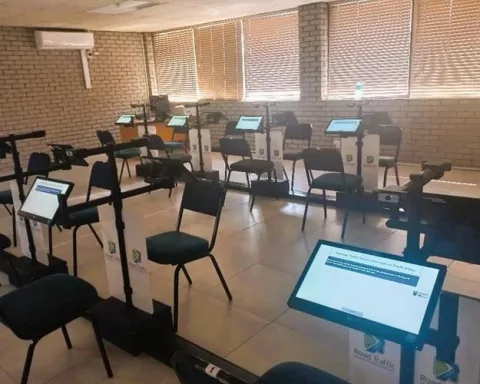Anele Mdoda, a popular radio host, had a scary experience during an Uber ride in Cape Town. She used a feature to ask her driver not to talk, but the driver made an inappropriate comment about sexual violence. Anele shared her feelings on Instagram Live, shining a light on safety issues and how technology can help or hurt us. Her story highlights how important it is for everyone to feel safe in public spaces and reminds us that we need to be aware of how we use ride-sharing apps.
What happened between Anele Mdoda and her Uber driver?
Anele Mdoda faced a distressing incident during an Uber ride when her “do not talk to me” preference led to an inappropriate comment from the driver. She shared her experience on Instagram Live, highlighting issues of safety and technology in urban environments.
Setting the Scene in Cape Town
Cape Town, a city known for its dynamic and multifaceted nature, recently became the backdrop for a significant incident involving Anele Mdoda, a prominent radio and television host, and an Uber driver. This event did more than just capture public attention; it highlighted critical issues surrounding safety, technology, and the human experience in the modern urban environment. By reflecting on this episode, we can delve into the delicate balance between the conveniences of digital life and the imperative of personal security—a crucial discussion in today’s rapidly evolving world.
Mdoda, who captivates audiences every morning on the 947 breakfast show, encountered an unsettling situation that she described as deeply distressing. It all began with her opting for a common feature in many ride-sharing apps: the “do not talk to me” setting, intended to provide a silent, private journey. However, this choice unexpectedly set off a series of unnerving exchanges. During the ride, the driver reportedly made a deeply inappropriate comment regarding sexual violence, a moment Mdoda recounted with visible emotion on social media.
The Digital Age: Public and Personal Boundaries
In our digital era, where the lines between private and public life frequently blur, Mdoda’s choice to document her ordeal on Instagram Live signifies a modern method of seeking both protection and community support. Her live broadcast served dual purposes: it was a call for immediate assistance and an effort to publicly document the experience. This raw footage captured Mdoda’s distress and her resolve to ensure the driver faced consequences, highlighting technology’s essential role in today’s safety narratives.
This incident not only caught the attention of law enforcement but also prompted a response from the Western Cape E-Hailing Association. Chairperson Siyabonga Hlabisa focused on the necessity of understanding the full context of the situation, reaffirming the association’s dedication to resolving conflicts between drivers and passengers. Such a stance reflects an urgent societal need to manage technology-facilitated interactions, ensuring that platforms like Uber remain both safe and dependable for their users.
Additionally, Hlabisa’s comments underscore a significant gap in knowledge and education regarding app functionalities. Although features like silent ride preferences aim to enhance user experience, a disconnect often exists between availability and awareness. This gap can lead to misunderstandings, as illustrated by Mdoda’s unsettling experience. Bridging this divide requires a joint effort from service providers and drivers to ensure comprehensive knowledge and consistent application of these technological tools.
Corporate Responsibility and Social Implications
In response to the incident, Uber proactively reached out to Mdoda, signaling the company’s commitment to addressing customer safety concerns. Mdoda noted that Uber contacted her, expressing the seriousness with which they were treating the situation. Such corporate accountability is vital for maintaining public trust in digital platforms that significantly impact everyday life.
Mdoda’s experience also sheds light on broader societal issues, particularly the harassment and intimidation women face in public spaces. Unfortunately, these incidents are not isolated; they resonate with a historical pattern of gender-based violence prevalent in many societies. This particular event underscores the ongoing struggle for women’s safety and equality, both in public and digital spheres.
Looking back at historical patterns, feminist movements of the late 20th century tirelessly worked to bring issues of personal safety and harassment into public discourse. Today, technology provides a new arena for these discussions, where digital platforms can either mitigate or amplify such concerns. Mdoda’s encounter epitomizes this dual nature of technological progress, showcasing both its potential and pitfalls.
A Broader Narrative of Technology and Society
From an artistic viewpoint, personal accounts like Mdoda’s echo the emotive storytelling characteristic of contemporary art. Much like narrative-driven artworks, her real-time documentation captures raw human emotion and vulnerability. This type of storytelling not only informs but also evokes deep empathy, urging society to reflect on and address underlying issues.
As the investigation progresses, with police spokesperson Sergeant Wesley Twigg confirming ongoing inquiries, the situation remains at the center of discussions about safety, accountability, and the power dynamics inherent in e-hailing services. The call for a comprehensive investigation highlights an institutional commitment to justice and the protection of all individuals navigating modern urban environments.
In conclusion, the encounter between Anele Mdoda and her Uber driver weaves a rich tapestry of themes for analysis. It underscores the intersection of technology, safety, and societal norms, prompting a broader reflection on how digital advancements influence our experiences and interactions. As society continues to navigate these complexities, fostering safe and equitable spaces for all requires ongoing dialogue, education, and accountability.
FAQ
What incident did Anele Mdoda experience during her Uber ride in Cape Town?
Anele Mdoda had a distressing experience during an Uber ride when, despite selecting the “do not talk to me” feature, the driver made an inappropriate comment about sexual violence. She later shared her feelings about this incident on Instagram Live, emphasizing issues of safety and technology.
How did Anele Mdoda share her experience with the public?
Mdoda took to Instagram Live to document her experience, which served multiple purposes: seeking immediate support and raising awareness about safety concerns in ride-sharing situations. Her reaction highlighted the importance of community support and the need for accountability in such incidents.
What was the response from Uber regarding the incident?
Uber proactively reached out to Anele Mdoda following the incident, indicating the company’s commitment to addressing customer safety concerns. This response signifies the importance of corporate accountability in maintaining public trust in digital platforms.
How did the Western Cape E-Hailing Association respond to the situation?
Siyabonga Hlabisa, the chairperson of the Western Cape E-Hailing Association, emphasized the need to understand the full context of the situation and pledged to resolve conflicts between drivers and passengers. This underscores the pressing need for awareness and education regarding ride-sharing app functionalities.
What broader societal issues does Anele Mdoda’s experience highlight?
Mdoda’s encounter underscores the persistent harassment and intimidation women face in public spaces. It links to a historical pattern of gender-based violence and reflects the ongoing struggle for women’s safety and equality in both physical and digital domains.
Why is technology’s role in this incident significant?
The incident illustrates the dual nature of technology in modern society—it can facilitate safety and community support, as seen in Mdoda’s live broadcast, but it can also amplify risks and misunderstandings. This complexity necessitates ongoing dialogue about the balance between technological convenience and personal security in urban environments.












